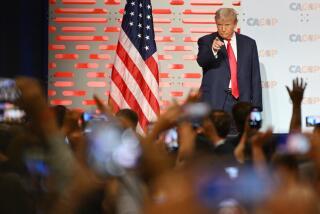Trump’s week: Important signals masked by huge amounts of noise
The Trump presidency often plays out as a drama on two levels — a high-decibel reality show coupled with a stumbling, but persistent, effort to achieve conservative policy goals.
This week vividly illustrated both.
President Trump fell into a quarrel with the family of a slain soldier, a public spat with overtones of race and mutual disrespect that both sides relentlessly escalated.
At the same time, the Senate took an important, but preliminary step toward passing a major tax-cut bill, and lawmakers began preparing for a potentially massive year-end clash in which immigration, healthcare and a government shutdown could all be at issue.
Good afternoon, I’m David Lauter, Washington bureau chief. Welcome to the Friday edition of our Essential Politics newsletter, in which we look at the events of the week in Washington and elsewhere in national politics and highlight some particularly insightful stories.
ANATOMY OF A TRUMP FEUD
The president’s public fight with the family of Sgt. La David T. Johnson, killed in an ambush in Niger, followed to a T the outline of a classic Trump feud.
On Monday, at a news conference that he called at the spur of the moment, not giving his staff time to prepare, Trump was asked, “Why haven’t we heard anything from you so far about the soldiers that were killed in Niger?”
He responded defensively — by now, that almost goes without saying. Rather than answer the actual question, which was about his lack of public comment on the incident, he talked about his private response to the families of the deceased. He had written letters to them, which would be sent soon, he said, and then falsely added that President Obama “didn’t make calls.”
Democrats predictably responded with rage. Trump, also predictably, doubled down. The next day he told an interviewer from Fox radio that Obama hadn’t called Gen. John Kelly, Trump’s chief of staff, when his son was killed in Afghanistan.
Trump then proceeded to call some families, and everything got worse. He told Johnson’s widow that her husband had known what he was signing up for when he joined the military. Rep. Frederica S. Wilson (D-Fla.), a friend of the Johnson family, recounted the remark to local television reporters, saying that Myeshia Johnson had been upset. Trump denied having said that — a denial that the White House now admits was false — and the cable news cycle went wild.
A combination of bad White House staff work, lack of planning and a president unable to resist a quarrel all contributed to the incident, as Noah Bierman, Brian Bennett and Bill Hennigan wrote in their analysis of how Trump’s response to four soldiers’ deaths went so wrong.
Thursday, the saga took its latest spin as Kelly went to the White House briefing room to offer a dignified account of how military families are told of the deaths of a loved one and a reasonably persuasive explanation of what Trump meant to say. Rather than leave it there, however, he escalated the dispute further, accusing Wilson of having betrayed a “sacred” confidence and being an “empty barrel.” She fired back in kind.
Meantime, as Hennigan reported, the Pentagon is investigating just what happened in the Niger ambush and why four soldiers died.
CIRCUSES, NOT BREAD
We’ll not know for a week or so whether this latest fracas has an impact on public opinion. The experience of the past two years suggests it will harden attitudes on both sides.
That hardening often seems the only purpose for Trump’s actions — his public battles have made him unpopular with a majority of Americans, but attract and hold the loyalty of his core supporters.
Without such fights, some of his voters might focus more on topics like this: Trump’s efforts to reverse Obama’s policies toward climate change have brought little if any help to coal country, as Evan Halper reported.
THE ESTABLISHMENT STRIKES BACK
In a strikingly tough speech, which did not mention Trump by name but blistered his approach to politics, George W. Bush suggested the president promotes falsehoods and prejudice, Mark Barabak reported.
Bush’s remarks came the same week in which Sen. John McCain (R-Ariz.) denounced “spurious nationalism” — a thinly veiled shot at the populism of Steve Bannon, Trump’s former top strategist.
Combined with remarks earlier this month by Sen. Bob Corker (R-Tenn.), the chairman of the Senate Foreign Relations Committee, the comments amounted to the most sustained public criticism of Trump by the GOP establishment since the 2016 Republican primaries.
EFFORTS TO MEND FENCES — SORT OF
Whether Trump has much to fear from an establishment he soundly defeated is an open question, but his legislative goals require a functional relationship with Senate Republicans. He took a step toward fixing that problem on Monday, hosting a lunch with Majority Leader Mitch McConnell (R-Ky.).
As Lisa Mascaro and Noam Levey wrote, Trump praised McConnell and said he would try to rein in Bannon’s war on GOP incumbents — at least a bit.
Republican lawmakers find themselves in a nasty crossfire, as Bannon and donors linked to the Koch brothers all take aim, as Mascaro wrote. The two factions disagree on many issues, but are united in their disdain for the current Congress’ legislative record.
Bannon is scheduled to speak tonight to the California GOP convention. That makes some Republicans very nervous, Phil Willon wrote.
We will cover the speech and the weekend convention live from Anaheim here.
HEALTHCARE TWO STEP — OR THREE STEP
Trump also signaled for the first time on Monday that he could accept a legislative fix to Obamacare. The next day, key senators announced a bipartisan deal to stabilize Obamacare markets.
Over the next few days, Trump indicated that he was for the deal, then against it, then for it again, leaving all sides uncertain about his plans.
Whether that’s deliberate strategy or just confusion is a recurring question about him.
But as Mascaro wrote, beneath all the back-and-forth, Congress and the White House are setting the stage for a year-end showdown when lawmakers have to pass legislation to fund government agencies. Healthcare fixes, the fate of the young immigrants known as Dreamers and a possible government shutdown will all be on the table.
House Minority Leader Nancy Pelosi weighed in on this topic and Democratic leverage at an event hosted by the LA Times and the Berggruen Institute Wednesday. Watch the video.
OTHER NOTABLE STORIES
Senate Republicans approved a budget with a $1.5-trillion deficit to pay for Trump’s tax cuts. Here’s a timeline of the next steps ahead for the tax measure.
And Don Lee analyzed why tax cuts likely won’t generate as much economic growth as Trump hopes.
A young, pregnant migrant’s plight has become a test of Trump policies on abortion and immigration, Joe Tanfani wrote. A federal appeals court heard arguments in her case this morning.
Obama reemerged on the campaign trail, and as Cathy Decker wrote, he took a few swipes at Trump as he stumped for Democratic candidates in New Jersey and Virginia.
Trump met with Janet Yellen and, as Jim Puzzanghera wrote, said a decision will come soon on whether to nominate her for a second term as head of the Federal Reserve or go with someone else.
Answering questions from reporters, Trump basically confirmed widespread reports that the other candidates are Jerome Powell, who is currently on the Fed board, Stanford economist John Taylor, former Fed governor Kevin Warsh and Gary Cohn, the top White House economic advisor. Treasury Secretary Steve Mnuchin reportedly favors Powell.
A judge kept alive the bribery case against Sen. Bob Menendez of New Jersey. As Tanfani wrote, his trial has become a test for prosecutors of how severely a Supreme Court decision last year has limited federal bribery law.
Trump’s pick for drug czar stepped aside after news reports renewed scrutiny of a bill he pushed in Congress that weakened the government’s power to restrict shipments of opioid drugs. Now, Congress may revisit the law, as well.
NATURAL DISASTERS AND THE FEDERAL BUDGET
This year’s costly hurricanes have renewed questions about the future of federal flood insurance. There’s widespread agreement that government policies toward flood coverage aren’t achieving their goals, but lots of disagreement about solutions, Lauren Rosenblatt wrote.
Much the same goes for the government’s response to wildfires, Halper wrote. Sometimes, Washington’s formula for fighting wildfires makes them worse.
ALL THE PRESIDENT’S TWEETS
Twitter has long been Trump’s favored means of pushing his message. We’re compiling all of Trump’s tweets. It’s a great resource. Take a look.
LOGISTICS
That wraps up this week. My colleague Christina Bellantoni will be back Monday with the weekday edition of Essential Politics. Until then, keep track of all the developments in national politics and the Trump administration with our Essential Washington blog, at our Politics page and on Twitter @latimespolitics.
Send your comments, suggestions and news tips to politics@latimes.com.
If you like this newsletter, tell your friends to sign up.
More to Read
Get the L.A. Times Politics newsletter
Deeply reported insights into legislation, politics and policy from Sacramento, Washington and beyond. In your inbox three times per week.
You may occasionally receive promotional content from the Los Angeles Times.







